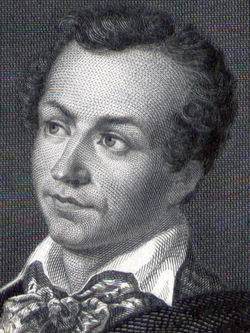
Marie-Antoine Carême (French: [maʁi ɑ̃twan kaʁɛm]; 8 June 1783 or 1784 – 12 January 1833), known as Antonin Carême, was a leading French chef of the early 19th century.
Carême was born in Paris to a poor family and, when still a child, worked in a cheap restaurant. Later he became an apprentice to a leading Parisian pâtissier and quickly became known for his patisserie skills. He was deeply interested in architecture and was famous for his large pièces montées – table decorations sculpted in sugar, depicting classical buildings.
Working with leading chefs of the day, Carême extended his knowledge to cover all aspects of cooking, and became head chef to prominent people including Charles Maurice de Talleyrand-Périgord, Tsar Alexander I of Russia and the Prince Regent in Britain. He codified and to some extent simplified classical French cookery, insisted on the finest and most expensive ingredients, and was regarded as the foremost chef of his day.
Carême wrote a series of books, lavishly illustrated, intended to pass his skills on to other chefs providing grande cuisine for the elite of French, and other, society. His influence continued after his death; his approach was continued by Jules Gouffé, Urbain Dubois and Émile Bernard, reinvigorated by Auguste Escoffier and continued until it was overtaken by nouvelle cuisine in the second half of the 20th century.
Source : Wikipedia